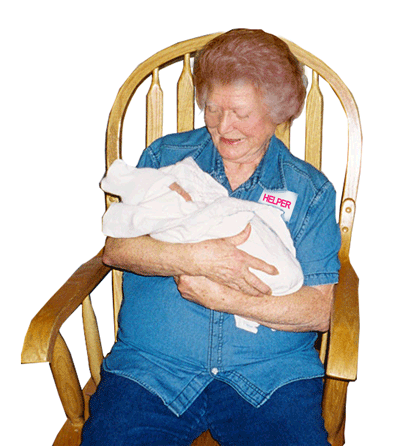The doorbell rings, and there stands a kid from the nearby high school band selling discount coupon cards. You constantly receive fund-raising letters: kids going on mission trips, political organizations, relief organizations, animal rescue groups, wildlife preservation organizations, churches and homeless shelters. How do you, as an economizer, deal with all these requests for money? Should you give if you’re in debt? Do you give to everyone that asks?
It’s taken us years to arrive at what we feel is an equitable balance for our charitable giving. There is no right or wrong way. Even religious leaders disagree on the subject of giving. We’ll share what we do, but our bottom-line encouragement is that everyone should be giving something. And we aren’t talking about just giving money.

There are so many rewarding ways to give of yourself— even sitting in a rocking chair and snuggling a baby can meet a need.
Giving When Money is Tight
If money is really tight or you’re upside down financially and behind with credit card payments, utility bills, mortgage payments or car payments, you shouldn’t be giving money. How do you think a creditor would react who learned that you had given money to your church, but couldn’t send in your regular payment? When we’re trying to stabilize people struggling with debt, we often encounter a deep conviction that they must keep giving money to their church. We agree that supporting the local church is important, but we ask them to consider another option until they get back on their feet financially. We encourage them to be creative and give of their time rather than money. Can you assist at your child’s club — making a few phone calls or helping with a mailing? Can you volunteer at a food bank? Can you rock a baby in the church nursery? These are all forms of giving that have great value.
If you have established a household budget (see June 2004 and July/August 2004 issues) you know how much you can afford to donate on a monthly basis. If you haven’t yet established this habit, you may be giving away money that you need for today’s living expenses—and possibly savings you’ll need six months down the road. We’ve seen a direct correlation between people managing their money with a budget and increases in their charitable giving — it happens every time.
Early in our marriage when money was really tight, we had a friend who worked for a counseling ministry that didn’t charge for services. His family lived on financial support he raised from friends and family. We wanted to donate to their ministry but didn’t have the funds. Instead, Steve would help the husband — who wasn’t very handy with tools — with home repair chores. We have other friends — some who are retired and others still in the workforce — who donate their professional services, such as accounting and bookkeeping, graphic design know-how and administrative help, to various charities. This is their way of giving and it is always appreciated.
We Don’t Give Cash!
We’ve come across some rather dire financial situations. It’s really tough to see people go through the financial wringer. What do you do? They need to pay the rent, buy groceries and put gas in the car. Should we give them cash or write a check? NO. “No? Isn’t that a bit hardhearted?” you ask. Nope, it isn’t. Giving cash is about the worst thing you can do. There are reasons why people get into financial binds, and unless you know all the details, you may actually prolong the problem. The real solutions are often more involved than merely having money to pay the bills. A person in desperate financial straits may need help prioritizing expenses. Creditors can apply such pressure that an insignificant bill may get paid with money that should be saved for rent. When we help someone in this type of situation, we offer to pay a bill by writing the check directly to the utility company, landlord or medical provider (negotiating a discount if possible). We also commit to the relationship and follow up with meetings, e-mails or phone calls to encourage them to keep trying. We’ve purchased lots of grocery gift cards and gas cards, and have filled lots of grocery bags with extra items we’ve had stocked in our pantry.
Another way to support those in need is to help them get government or social services assistance. Walking with them as they negotiate the bureaucratic red tape of welfare, food stamps and Medicare is a huge help. Or assist them in finding food banks or clothing banks or other charitable groups. Many people don’t need government assistance for very long, especially if they have a friend like you helping them get re-established. Your encouraging words, car rides and logical direction will help them gain control of their finances.
What About Kids Selling Door-to-Door

One tightwad publication used to espouse a philosophy about kids and fundraising. They refused to endorse purchasing overpriced goods from kids going door to door raising funds for their organizations. We differ with this philosophy. Sure, the stuff they sell is ridiculously overpriced, but when a kid from a family you know is out pounding the pavement trying to raise money for summer camp, he or she should be applauded, encouraged and supported. As our kids have traversed the streets of our neighborhood raising funds or collecting items for a food bank, they have been shocked at some of the rude responses they have received — doors slammed in their faces without a word or people running into their houses, then not answering the door. It has made great fodder for dinner table discussions.
A neighbor of ours shared his philosophy with us. Dick said, “If a child comes to my door selling something or raising funds, I always ask him straight out, ‘Do you live in my neighborhood?’ Then I ask, ‘Where?’ I’ve been here a long time and know most of the families and all the names of the streets. If they pass my little test, I will always buy something from them. It could be Girl Scout cookies, Boy Scout Popcorn and Greenery or a high school sports team item, but I buy something. Sometimes I buy the least expensive item they offer. Even one box of Girl Scout cookies helps them and doesn’t break my bank. I want to encourage them in pursuing activities that build character.’” If you have no funds available, just say, “Honey, I’d love to help you out, but I just can’t right now.”
If the child is selling a coupon book and we have no need for it, many times we’ll write a check for five or ten dollars as a donation. However, our “At the Door Giving” stops with our neighborhood. We never give to an adult stranger asking for donations or an older kid who says he is selling magazine subscriptions to keep him off
the streets.
Where to Give
Our family chooses to support charities/ministries which mainly benefit people. It’s not that we are anti-animal; as a matter of fact, we love animals. Both our dogs came from rescue situations and were literally skin and bones when they came to live with us. Now, both are sterilized and they are “fat and sassy.” Still, the decision regarding which types of organizations to support is a personal one — there is no right or wrong answer. Many groups share God’s love with hurting people all over the globe. We’ll provide a list of suggestions of several charitable organizations that we know of, which operate with integrity, as an online form this month.
When considering which charity to support, check their standing with two watchdog groups:
(1) The Evangelical Council for Financial Accountability (ECFA) has stringent reporting requirements for their 1,150 members. Visit EFCA.org for more details.
(2) Better Business Bureau has information on their website where they post evaluations of thousands of charitable organizations. The evaluations are based on numerous factors, including how the charity is managed and the percentage of donations used for relief efforts, fundraising, and administrative costs. If the group you are researching isn’t listed, contact your local Better Business Bureau. They have information on smaller local charities.
We try to balance our giving among local, national and international agencies. While many stellar national and international organizations provide great services, don’t neglect to give to local charities such as food banks, homeless shelters, and soup kitchens. They often provide much-needed personal relief to people in your city. Don’t forget orphanages, adoption, and foster-care agencies, as well as crisis pregnancy centers. Also, consider clubs and teams that your children are involved with or that you were part of as a kid.
Giving As a Family
We try to be involved as a family in the organizations we support. If a missionary we support is in town for a visit, we host a dinner where other supporters can gather, too.
Steve competed on Arizona State University’s men’s gymnastics team. He has stayed in touch with his coach and several teammates. In 1994, under the guise of Title X, funding for the team was eliminated. But their tenacious coach, Steve’s former teammate Scott Barclay, created a club team and formed a 501(c)3 tax deductible organization. Steve served as the club’s first president and started fundraising. Since that time, the team has consistently produced all-Americans, national champions and won national championships. But more importantly, because of former Coach Robinson’s and Scott’s depth of character, the team has had a huge impact on thousands of young men over the past 40 years. The team continues to survive and win in spite of the university tearing down the historic practice facility two years ago. University officials said they needed the space for a new building, but nothing has been built, and the space has recently been landscaped with rocks and cacti — hmmmm. Scott has just completed building a world-class work-out facility to house the team and his gymnastics training center for kids — see his Web site, www.aspirekidsports.com/. As a family, we support Scott and the team. We want our kids to be exposed to a group of heroes — people who continue to fight no matter the odds and continue to win. Steve has retired as president of the booster club, but we still attend meets where Annette, Becky, and Abbey often help with the booster table or box office, Roy and Joseph offer all-around help as runners and in tearing down equipment, and Steve usually does the announcing for the competition. Most charities or 501(c)3 organizations have a compelling story and a need for assistance. Finding a match is rewarding for everyone involved.
Our family gives to 27 charities each year. We don’t give to all of them every month. And sometimes the amounts we give are not very large, but most non-profits are always in need of funding, so every little bit is appreciated. The kids have their own giving money that goes to groups they want to support and is sometimes pooled to have a greater impact. Whatever your philosophy, giving time, money or both is a wonderful way to make life much richer.
* * * * * * * *
We have posted a list of several charities that we support. It provides information on the organizations and the people involved. See it here

